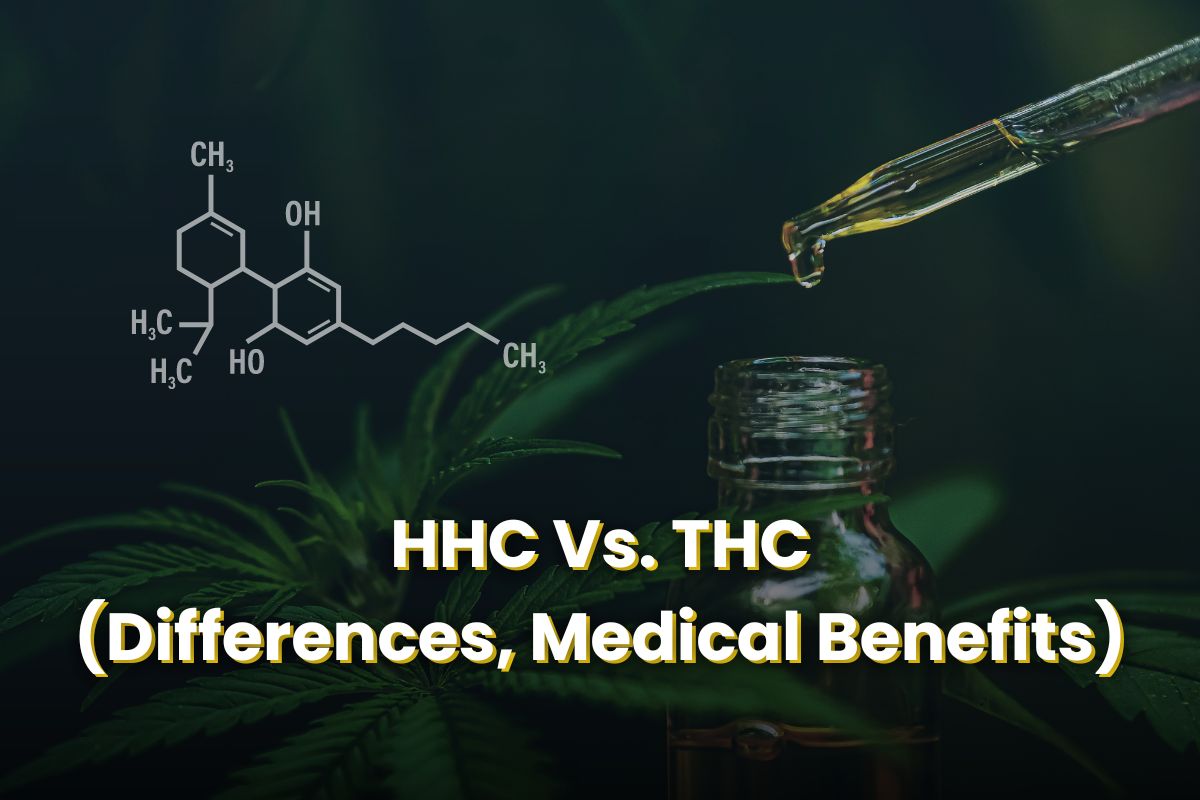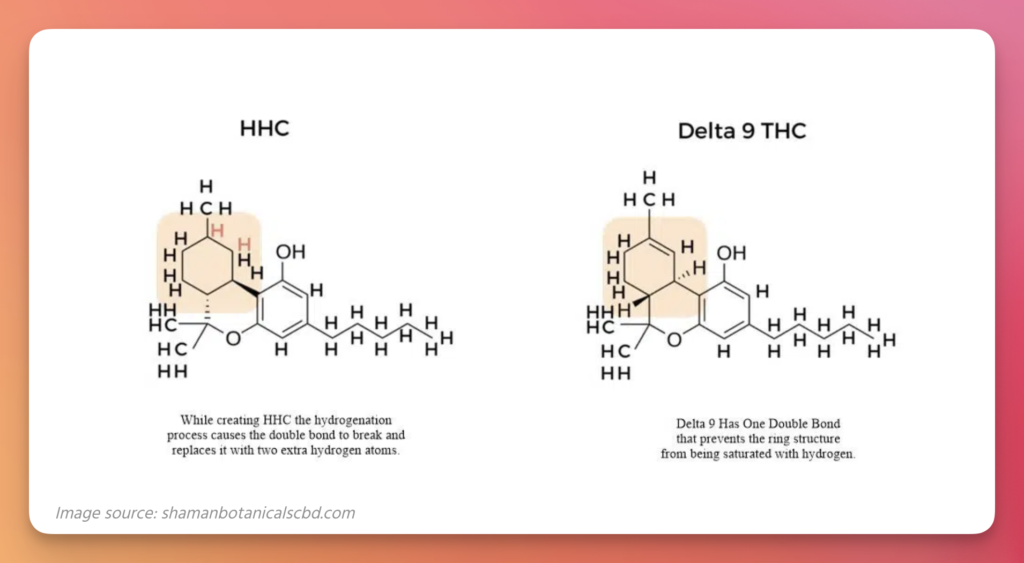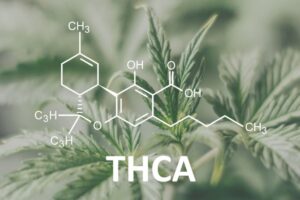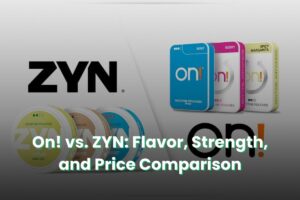
THC (Tetrahydrocannabinol) and HHC (Hexahydrocannabinol) are both substances of cannabinoid. These components are derived from cannabis plants. They are directly linked with the psychoactive effects associated with marijuana. Even though they are both cannabinoids, HHC vs THC will reveal their core differences.
THC is a primary and natural psychoactive substance that interacts with brain and nervous system receptors and exhumes euphoria and relaxation. It is responsible for the intoxicating effects of marijuana use. On the contrary, HHC is a synthetic substance derived from THC through a process of hydrogenation.
Here, I will delve into the complex realm of THC and HHC and explain the core differences between them.
What Is HHC?
Hexahydrocannabinol (HHC) is a psychoactive substance that possesses marijuana activity. This cannabinoid is a hydrogenated formation of THC. This is a synthetic relative of THC. You can extract it from cannabis naturally, but the concentration amount is too small for commercial production.
Due to its rarity in nature, manufacturers employ a scientific process to extract the HHC concentration. They do this by adding hydrogen atoms to THC (ex. delta-9-THC), a reaction that breaks the THC bond structure and replaces it with hydrogen atoms.
This sustains the cannabinoid’s similar potency. This process, known as hydrogenation, is how HHC is commercially manufactured by altering the THC bond.
What is THC?
THC, or Tetrahydrocannabinol, is a cannabinoid that can be naturally found in cannabis. It contains psychoactive properties. THC is a primary psychoactive component. This compound directly interacts with cannabinoid receptors in the brain and nervous system. This association leads to euphoria, appetite, and relaxation.
In nature, THC subsists in various forms. Delta-9 THC is very common and easily found in nature. Here are some other variants of THC.
- Delta 10 THC is a less widely recognized form of THC with a molecular structure comparable to Delta 9 THC. It is made by turning CBD or other types of cannabinoids into Delta 10 THC via synthetic methods.
- Another popular form is Delta-8 THC, which has a similar structure with different chemical bonds.
- THC-V is a cannabinoid present in modest levels in some cannabis strains. It has a similar molecular structure to THC but with minor differences. It is well-known for its appetite-suppressing properties.
- THC-A, the acidic form of Delta 9 THC, may be discovered in raw cannabis plants. It does not have any psychotropic effects in its unprocessed form.
- THCP (Tetrahydrocannabiphorol) is a rare isomer of THC that contains a longer carbon chain than Delta 9 THC.
- Lastly, THCV (Tetrahydrocannabivarin) contains different effects and reactions than other THC types. If you are looking for an authentic source to read the information about THC then check out I Love Growing Marijuana. On this website, you can find all the important details about cannabis related topics that can help you in more than one way.
Effects: HHC vs THC

HHC has a milder psychoactive response than THC. HHC provides a more focused experience and clear conscience to the consumers. It has a more functional and balanced effect with reasonable doses. You will feel less intoxicated or foggy with HHC products. It offers a mild euphoric effect with a clear-headedness.
THC is fundamentally responsible for the euphoric response. When THC collides with receptors, it exhumes relaxation, euphoric sensation, and upscaled appetite. Depending on the doses, some users may also experience paranoia and anxiety. A higher dose can adversely influence personal sensitivity and anxiety.
THC may decrease short-term memory, concentration, attention, and focus. It can also impair coordination, response time, and cognitive function, especially at larger dosages. Some people may feel anxiety, paranoia, or other unfavorable psychological reactions after taking THC, particularly at large dosages or if they are predisposed to such effects.
When consumed in the same dose or amount, HHC has a more long-lasting effect than THC. THC’s effect can last a few hours, but HHC can outlast the effect of THC by adding a few more hours.
Medical Benefits: HHC vs THC
THC has a ton of potential therapeutic properties. Here are some medical areas where THC substances are utilized.
Pain Relief
THC has shown promise in treating chronic pain, including neuropathic pain and pain caused by illnesses like multiple sclerosis and cancer.
Nausea And Vomiting
THC has been used to treat nausea and vomiting, especially in cancer patients receiving chemotherapy or people living with AIDS.
Increase Appetite
Medications containing THC substances are reported to stimulate appetite. This is particularly beneficial for those who have eating disorders that cause them to eat less and lose weight.
Relieve Muscle Spasm
THC may help relieve muscular spasms and spasticity, which are common in illnesses such as spinal cord injuries and multiple sclerosis.
Sleep Improvement
Many users have disclosed that THC has been very helpful in enhancing sleep quality in them. However, the effects vary according to the dose and the person.
HHC
HHC, on the other hand, has been studied and explored less in research. However, its medical benefits can include stress reduction as it contains a relaxing component. Similar to THC, it can work as pain relief. HHC can be used for sleep enhancement and stimulation of appetite.
Even though both THC and HHC contain potential medical benefits, this field is still not explored properly. It can’t be concluded that these medical benefits don’t come with any side effects.
Pharmacological Effects: HHC vs THC
THC acts as a partial agonist of the CB1 and CB2 receptors of the body’s endocannabinoid system (ECS). It interacts with these receptors to create a variety of pharmacological actions.
Activation of CB1 receptors in the brain produces a variety of effects, including pleasure, relaxation, altered sensory perception, and increased hunger.
THC may also have pain-relieving characteristics, anti-inflammatory effects, and possible advantages in treating nausea and vomiting. THC may also alter other neurotransmitter systems in the brain, including dopamine and serotonin, adding to its complicated pharmacological profile.
HHC is structurally identical to THC. Its pharmacological effects are not as well studied as THC’s. While HHC is thought to interact with the CB1 and CB2 of endocannabinoid system receptors in the same way as THC does, its exact binding affinity and activity are unknown.
HHC is frequently regarded as having a lesser psychoactive effect than THC, indicating that its interactions with cannabinoid receptors and other neurotransmitter systems may vary to some extent.
Legality: HHC vs THC
When the 2018 Farm Bill was passed, it altered the course of the legality of HHC and THC. Here, you have to learn about the recent law and its impact.
Legality of HHC
On the federal level, HHC is not designated as a substance scheduled in the bill. As per the Farm Bill 2018, only legal and unregulated HHC substances will be hemp-driven items that contain 0.3% delta-9 THC or less. This rule is applicable to HHC gummies and Vape carts.
Different states have different laws on the state level. Some states are silent about HHC use and conform to federal laws. Some other states prefer to impose their own rules on their state laws. Considering their legality, state laws can be categorized into four categories.
- Illegal
- Likely illegal
- Likely legal
- Legal.
Legality Of THC
THC is regulated under the Controlled Substances Act in the USA. This act has scheduled this substance. Such classification can open the channel for drug abuse beyond medical usage. So, it is declared illegal in the USA. Conversely, for hemp-driven THC, the Farm Bill 2018 would be applied. For THC, the final product can’t contain more than 3% of Delta 9 THC.
On the state level, around 38 states have declared THS legal for medical benefit. Only 24 states have legalized the use of THC for recreational purposes. Some states have allowed commercial distribution and personal cultivation for recreational purposes.
Local laws play a crucial role and vary from state to state. Always consult with the state law for both THC and HHC. The accessibility and availability may depend on the jurisdiction.
Availability: HHC vs THC
As a primary and natural component of cannabis, THC is quite ubiquitous. You can find THC products within the legal range in stores and online. However, your state may not allow THC products other than for medical purposes.
So, you can only find them in dispensaries, over-the-counter, and with a prescription. Otherwise, THC products are available in edible, flower, or vape cartridge form.
Compared to THC, HHC is less far-reaching. As a synthetic material, its use and availability are monitored and scarce. You may try your luck in specialty stores or online. However, if your state legalized HHC substances, you may find them in online stores or Niche platforms.
European countries have stringent stances when it comes to Cannabinoids Store in Europe. You will find cannabis only if the country has declared it legal. Some countries have decriminalized the possession of a tiny amount of cannabis.
Legal highs denote the new psychoactive substances (NPS) that can provide the effects and sensations of narcotics like cannabis, heroin, and cocaine. Legal Highs in EU are legal and available throughout Europe.
Conclusion
When it comes to cannabinoids, there is always some debate about HHC vs THC. While THC is a primary component and can be found in nature, HHC is predominantly synthesized by altering the THC component.




